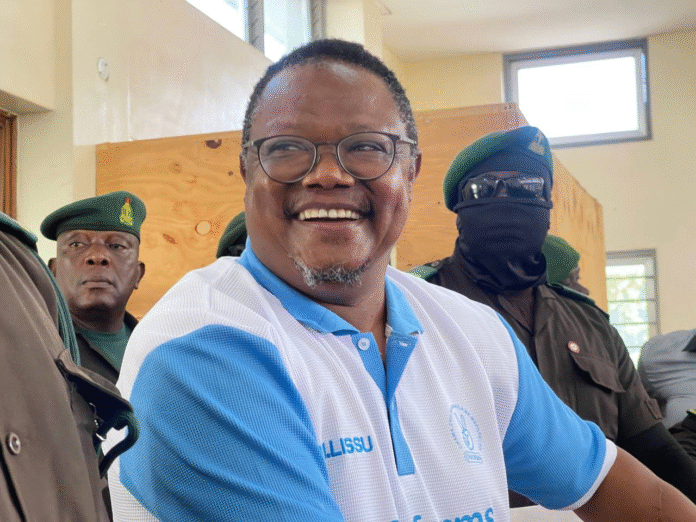
Tundu Lissu, the leader of Tanzania’s main opposition party, Chama Cha Demokrasia na Maendeleo (CHADEMA), was charged with treason on April 10, 2025, following his arrest on April 9 after a rally in Mbinga, Ruvuma Region.
The charges stem from a speech he allegedly made on April 3 in Dar es Salaam, where prosecutors claim he incited the public to “prevent the election” and “inspire rebellion” to disrupt the October 2025 general elections.
The charge sheet quoted him saying, “It is true we say we will prevent the election. We will inspire rebellion. That is the way to get change. So we are going to spoil this election.
We are going to really disrupt.” Treason in Tanzania is a capital offense, carrying a potential death penalty, and is non-bailable. Lissu was also charged with publishing false information, to which he pleaded not guilty, but he was not allowed to enter a plea on the treason charge during his initial court appearance at Kisutu Magistrate’s Court in Dar es Salaam.
The case has been contentious. Lissu refused to participate in a virtual hearing on April 24, insisting on an in-person court appearance, arguing that virtual proceedings violate transparency and his right to a fair trial. His legal team, led by Rugemeleza Nshala and supported by over 200 lawyers, including international lawyer Robert Amsterdam, called the charges politically motivated, aimed at silencing Lissu’s campaign for electoral reforms.
The court ordered Lissu to be physically presented for a preliminary hearing on May 19, 2025, where former Kenyan Chief Justice David Maraga was present, highlighting regional attention to the case. The trial has drawn criticism from human rights groups like Amnesty International, which condemned Lissu’s arrest as part of a broader crackdown on opposition leaders, citing mass arrests, abductions, and killings of government critics in 2024.
CHADEMA was disqualified from the 2025 elections for refusing to sign an electoral code of conduct, which the party viewed as a tool to suppress opposition. Lissu’s campaign, under the slogan “No Reforms, No Election,” demanded an independent electoral commission and changes to laws favoring the ruling Chama Cha Mapinduzi (CCM) party, which has held power since Tanzania’s independence in 1961.
The government’s actions, including the arrests of CHADEMA officials like John Heche and John Mnyika on April 24, have fueled accusations of authoritarianism under President Samia Suluhu Hassan.
Political Background: Tundu Lissu, a 57-year-old lawyer trained in Tanzania and Britain, has been a prominent opposition figure since entering politics in 1995 during Tanzania’s first multi-party elections.
Elected to parliament in 2010 under CHADEMA, he rose to vice-chairman and became party chairman in January 2025 after a contentious leadership contest. Known for his uncompromising stance, Lissu has been a vocal critic of the CCM’s dominance and electoral irregularities.
His political career has been marked by persecution: he was arrested eight times in 2017 under President John Magufuli’s regime and survived an assassination attempt that year, when he was shot 16 times outside his Dodoma residence.
The attack, which he believes was politically motivated, forced him into exile for medical treatment in Kenya and Belgium.Lissu returned to Tanzania in 2020 to challenge Magufuli in the presidential election but fled again after alleging fraud and receiving death threats. He came back in 2023, encouraged by President Samia Suluhu Hassan’s initial reforms, which relaxed some of Magufuli’s repressive measures, such as lifting a ban on political rallies.
However, optimism faded as Samia’s government faced criticism for resuming authoritarian tactics, including arrests and abductions of opposition figures. Lissu’s “No Reforms, No Election” campaign reflects his belief that Tanzania’s electoral system is rigged to favor CCM, a view shared by CHADEMA, which has accused the government of using the treason charges to neutralize Lissu ahead of the 2025 polls.
Context and Controversy:
The treason case has sparked debate about Tanzania’s democratic backsliding. While Samia was initially praised for opening political space after Magufuli’s death in 2021, human rights activists and the opposition argue her government has reverted to repression.
The International Democratic Union and the International Commission of Jurists have called for Lissu’s release, emphasizing that demanding electoral reform is not treason but a democratic right.
Posts on X reflect public sentiment, with supporters like @VanguardAfrica decrying the charges as “deplorable” and others noting Lissu’s resilience as a “great survivor” of Tanzanian politics. However, internal rifts within CHADEMA, with some members criticizing Lissu’s rigid approach, and the party’s disqualification from the elections complicate his efforts.
The case remains a critical test of Tanzania’s legal and political institutions as the country approaches the October 2025 elections.






